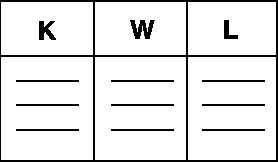| Home > Florida Then & Now > A Short History of Florida > K-W-L | |
K-W-L
KWL is a strategy typically used with nonfiction material. The students are to recall what they already know about a topic, what they want to know, and later what they have learned. It is also highly effective in introducing new themes or units of study, as well as a culminating activity.
The teacher prepares a K-W-L chart on posterboard.
- The students brainstorm what they already know about the topic. The teacher records this information under the K on the chart. Important: Accept all predictions. This is not a “teaching” time, you are merely recording what they think they know about the topic. Later you can reexamine their speculations as to whether they were indeed true or not.
- Under the W, the teacher lists what the students want to know about the topic. These must be formed as questions.
- After completing the reading assignment, or unit of study, the teacher lists what the students have learned through their assigned reading or unit of study.
- Items listed under the L can be categorized using a key. For example, when listing what they have learned about mammals, the class could devise a key such as, D for description, F for food and L for location. These designations can then be placed next to each item listed under the L.

Reference
Ogle, D. (1986). K-W-L: A teaching model that develops active reading of expository text. The Reading Teacher, 36(6), 564-570
| Home > Florida Then & Now > A Short History of Florida > K-W-L |
Exploring
Florida: A Social Studies Resource for Students and Teachers
Produced by the Florida Center for Instructional
Technology,
College of Education, University of South Florida © 2002.